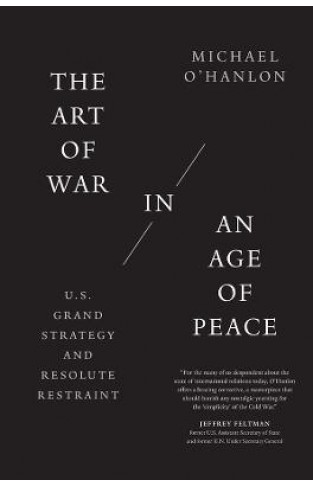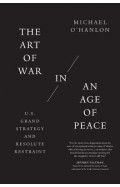- Home
- Non Fiction
- History
- The Art of War in an Age of Peace: U.S. Grand Strategy and Resolute Restraint
The Art of War in an Age of Peace: U.S. Grand Strategy and Resolute Restraint
By: Michael O Hanlon
-
Rs 5,196.75
- Rs 7,995.00
- 35%
You save Rs 2,798.25.
Due to constant currency fluctuation, prices are subject to change with or without notice.
An informed modern plan for post-2020 American foreign policy that avoids the opposing dangers of retrenchment and overextension
"A masterful examination of past American grand strategy and foreign policies. A compelling, thoughtful, and thought-provoking proposal of a new grand strategy by one of America's foremost writers and thinkers on U.S. defense, foreign policy, and geopolitics." -General David Petraeus, U.S. Army (Ret.)
Russia and China are both believed to have "grand strategies"-detailed sets of national security goals backed by means, and plans, to pursue them. In the United States, policymakers have tried to articulate similar concepts but have failed to reach a widespread consensus since the Cold War ended. While the United States has been the world's prominent superpower for over a generation, much American thinking has oscillated between the extremes of isolationist agendas versus interventionist and overly assertive ones.
Drawing on historical precedents and weighing issues such as Russia's resurgence, China's great rise, North Korea's nuclear machinations, and Middle East turmoil, Michael O'Hanlon presents a well-researched, ethically sound, and politically viable vision for American national security policy. He also proposes complementing the Pentagon's set of "4+1" pre-existing threats with a new "4+1": biological, nuclear, digital, climatic, and internal dangers.
An informed modern plan for post-2020 American foreign policy that avoids the opposing dangers of retrenchment and overextension
"A masterful examination of past American grand strategy and foreign policies. A compelling, thoughtful, and thought-provoking proposal of a new grand strategy by one of America's foremost writers and thinkers on U.S. defense, foreign policy, and geopolitics." -General David Petraeus, U.S. Army (Ret.)
Russia and China are both believed to have "grand strategies"-detailed sets of national security goals backed by means, and plans, to pursue them. In the United States, policymakers have tried to articulate similar concepts but have failed to reach a widespread consensus since the Cold War ended. While the United States has been the world's prominent superpower for over a generation, much American thinking has oscillated between the extremes of isolationist agendas versus interventionist and overly assertive ones.
Drawing on historical precedents and weighing issues such as Russia's resurgence, China's great rise, North Korea's nuclear machinations, and Middle East turmoil, Michael O'Hanlon presents a well-researched, ethically sound, and politically viable vision for American national security policy. He also proposes complementing the Pentagon's set of "4+1" pre-existing threats with a new "4+1": biological, nuclear, digital, climatic, and internal dangers.
The Art of War in an Age of Peace: U.S. Grand Strategy and Resolute Restraint
By: Michael O Hanlon
Rs 5,196.75 Rs 7,995.00 Ex Tax :Rs 5,196.75
Zubin Mehta: A Musical Journey (An Authorized Biography)
By: VOID - Bakhtiar K. Dadabhoy
Rs 472.50 Rs 1,050.00 Ex Tax :Rs 472.50
The Origins of Political Order From Prehuman Times to the French RevolutioN
By: Francis Fukuyama
Rs 3,505.50 Rs 3,895.00 Ex Tax :Rs 3,505.50
Manning Up: How the Rise of Women Has Turned Men into Boys
By: Kay Hymowitz
Rs 646.75 Rs 995.00 Ex Tax :Rs 646.75
The Obama Syndrome: Surrender At Home War Abroad
By: Tariq Ali
Rs 1,165.50 Rs 1,295.00 Ex Tax :Rs 1,165.50
The Quest For Meaning: Developing A Philosophy Of Pluralism
By: Tariq Ramadan
Rs 1,255.50 Rs 1,395.00 Ex Tax :Rs 1,255.50
The Pakistan US Conundrum Jihadists The Military And The People The Struggle For Control
By: Yunas Samad
Rs 1,255.50 Rs 1,395.00 Ex Tax :Rs 1,255.50
An Enemy We Created: The Myth Of The Taliban Al Qaeda Merger In Afghanistan 19702010
By: Alex Strick van Linschoten
Rs 3,412.50 Rs 5,250.00 Ex Tax :Rs 3,412.50
WikiLeaks: Inside Julian Assanges War on Secrecy
By: David Leigh & Luke Harding
Rs 552.50 Rs 850.00 Ex Tax :Rs 552.50
No similar books from this author available at the moment.
No recently viewed books available at the moment.
Zubin Mehta: A Musical Journey (An Authorized Biography)
By: VOID - Bakhtiar K. Dadabhoy
Rs 472.50 Rs 1,050.00 Ex Tax :Rs 472.50
The Art of War in an Age of Peace: U.S. Grand Strategy and Resolute Restraint
By: Michael O Hanlon
Rs 5,196.75 Rs 7,995.00 Ex Tax :Rs 5,196.75














-120x187.jpg?q6)





-120x187.jpg?q6)



-120x187.jpg?q6)



